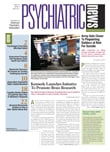APA has joined an impressive list of government officials, mental health advocacy groups and experts, scientists, and clinicians to launch former Congressman Patrick Kennedy's campaign to support the development of effective new treatments for neurological and mental disorders and dramatically increase funding for and coordination of brain research.
The American Psychiatric Foundation has stepped up with a $50,000 grant to support the conference that will launch the campaign, known as "The Next Frontier: One Mind for the Brain." The conference will be hosted by the Massachusetts General Hospital Starr Center from May 23 to 25.
On May 25, the conference will culminate with a gala event at the John F. Kennedy Library. That date marks the 50th anniversary of President Kennedy's speech rallying the nation to land a man on the moon by the end of the 1960s. The symbolism is no accident. Co-chairs Kennedy and Garen Staglin are referring to the Next Frontier campaign as a "moonshot to the mind," and its goal is to map what Kennedy calls the "inner space of the mind" within the next decade. And, of course, "Next Frontier" derives from the name that was given to John F. Kennedy's administration—"New Frontier." It came from a phrase in Kennedy's speech when he accepted the nomination for the U.S. presidency: "[W]e stand today on the edge of a New Frontier."
Patrick Kennedy's co-chair is a successful California businessman, wine maker, and philanthropist. The common experience of mental illness and health advocacy brought them together.
During 16 years in the U.S. House of Representatives, Kennedy wrote and co-sponsored dozens of bills on issues related to mental illness and improving the lives of people with psychiatric disorders. Also, he used his position and profile to raise understanding of these disorders, including speaking openly about his own battles with mental illness and those of his family. Staglin, faced with his son's schizophrenia, decided to take the issue of mental illness head on, raising over $750 million for various charities, including co-founding the International Mental Health Research Organization, BringChange2Mind, and the Staglin Family Music Festival for Mental Health (Psychiatric News, June 3, 2005).
In an interview with Psychiatric News, Kennedy spoke of the power of bringing together the best scientists in government and the private sector. Working on the Appropriations Committee and the National Institutes of Health subcommittee, he often chaired or participated in hearings on research opportunities in the neurosciences and found it "a privilege to have a front-row seat with the best scientists and researchers." In working on the mental health parity act, he realized how these experts can help shape and normalize the way the public views brain disorders. "As someone who has seen and experienced mental and substance issues, I took comfort in how science could destigmatize and bring mental health into overall health."
Kennedy believes that the biggest challenge for neuroscience is getting its political science in order. The first prong of this effort is getting the best and brightest together to consolidate scientific research efforts. The second prong is to educate the public on the plight of the men and women in the U.S. military who are returning home with traumatic brain injuries and posttraumatic stress disorder.
Toward the first goal, an impressive collection of scientists and organizations have joined the effort. In addition to APA, they include the American Academy of Neurology, American Association of Neurological Surgeons, American Brain Coalition, Brain Trauma Foundation, and Mental Health America. Many more agencies have committed their support to the campaign objectives.
"A sustained national commitment to brain research could have transformative impacts on science and society," said Steven Hyman, M.D., provost of Harvard University, professor of neurobiology at Harvard Medical School, and chair of the program and planning committee for the May scientific meeting. "Based on relatively recent advances in knowledge and technology, the neuroscience field is on the cusp of revolutionary discoveries that can open new avenues for scientific understanding as well as for better human health and functioning. It is crucial that this effort begin with a thorough evaluation of opportunities for major advances, and a diverse group of leading scientists and physicians is working along with NIH scientific leaders to identify the most promising avenues for further investigation and progress."
Jeffrey Borenstein, M.D., chair of APA's Council on Communications, hosted Kennedy and Staglin on his public television "Healthy Minds" program. He told Psychiatric News, "I think the One Mind for Brain Research campaign is an important initiative. Research has resulted in tremendous advances in psychiatric care, and there is tremendous promise for continued progress. For this reason it is important to have efforts like Congressman Kennedy's and Garen Staglin's to raise the awareness and funds to move forward. We were proud to have Congressman Kennedy and Mr. Staglin on our show."
Paul Burke, interim executive director of the American Psychiatric Foundation, told Psychiatric News that when Kennedy and Staglin came to the foundation in February with ideas and plans for the conference and requested a grant, the foundation board and APA's Board of Trustees gave their enthusiastic approval.
APA Medical Director and CEO James H. Scully, M.D., told Psychiatric News, "The brain is the most interesting organ—and the most complicated. It's good to have a champion like Patrick Kennedy." Scully is also chair of the foundation's Board of Directors.
On the issue of building public support for brain research, both Kennedy and Staglin believe that the country has no choice but to make this a national-security issue. They believe that if the country cannot take care of and protect its soldiers, they cannot protect the American people.
Kennedy said, "Brain issues are by far the most numerous injuries affecting our returning soldiers. Our heroes now need heroes of their own. The scientists doing the research that can unlock the cures to brain disorders can be those heroes."
Kennedy went on to point out that "the Next Frontier campaign will give soldiers the opportunity to be heroes all over again because the advances it may bring about will help them gain their lives back and serve as examples for others."
However, he continued, the Next Frontier campaign is not only about treating soldiers, but also about benefitting millions of other Americans as new treatments are developed and stigma is eradicated, once and for all.

